LGBTQ+ people
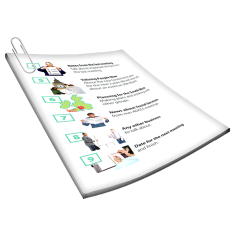
This information is about the mental health of people who identify as LGBTQ+.
It has information on
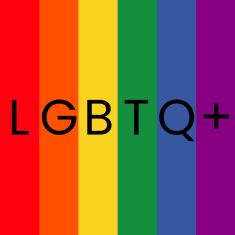
- Key points for people who identify as LGBTQ+

- Worries you might have when getting help for your mental health and what you can do
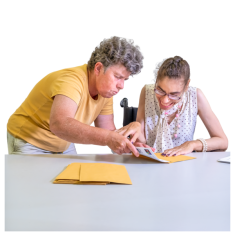
- Services and supports

LGBTQ+ stands for lesbian, gay, bisexual, transgender, intersex and questioning.
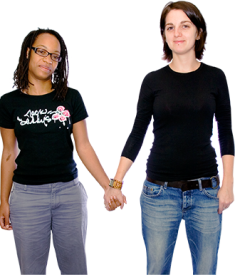
Lesbian means women who are attracted to women.

Gay means men who are attracted to men.

Bisexual means people who are attracted to both men and women.
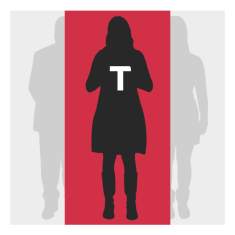
Transgender means people who are now a different gender to the one that they were given when they were born.

Questioning is if you feel that you might not be heterosexual but you are not sure.
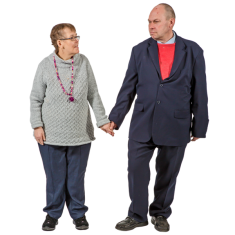
A heterosexual person is
- A woman who is attracted to men
or
- A man who is attracted to women

It is OK if you do not know what your gender or sexual identity is.
But it is important to learn about it.
Gender and sexual identity are part of who you are.
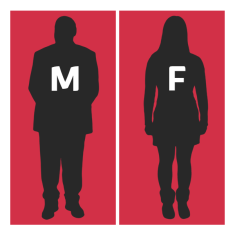
Your gender identity is about if you feel like a man or a woman.
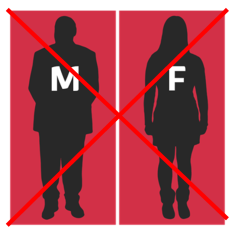
Some people do not feel like they are a man or a woman.
It is OK to not feel like a man or a woman.

Your sexual identity is about who you like and want to have sex with.

For example a person might identify as being heterosexual or LGBTQ+.
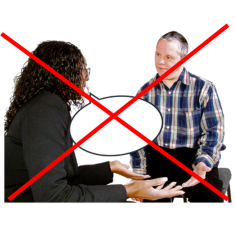
Health workers and support networks are not always good at talking to people about their gender or sexual identity.

People with intellectual disability might not get to learn about
- Sex
- What a healthy sexual relationship is
- Their gender or sexual identity

A relationship is a type of connection you have with people you enjoy spending time with.
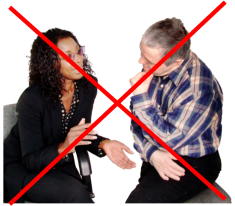
People with intellectual disability might not know it is OK to communicate about
- Gender
- Sexual identity
- Relationships
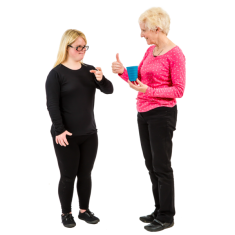
To communicate is how you understand and share your feelings or information.

People with intellectual disability might not know that they can ask for help if
- They are confused about their sexual identity
- They are in a relationship that is stressful
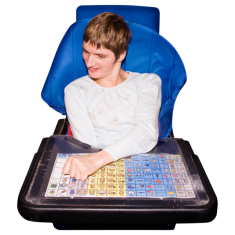
It is OK to communicate about your sexual identity and relationships.

You can learn more about healthy relationships and different LGBTQ+ words in the information sheets below
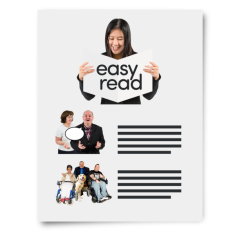
- Family Planning Australia's All About Sex factsheets https://www.fpnsw.org.au/
factsheets/individuals/disability/all-about-sex
- CHANGEs LGBTQ+ Easy Read guide https://www.changepeople.org/
our-work/lgbtq-an-easy-read-guide

Below are some worries you might have when you try to get support for your mental health.

We include some ideas for what you can do.

You do not know how to communicate with a mental health worker about your sexual identity
This is what you can do.
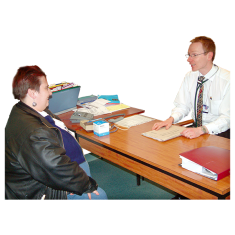
Mental health workers are people who work to help you with your mental health.

You might have questions about your
- Gender identity
- Sexual identity
- Relationships
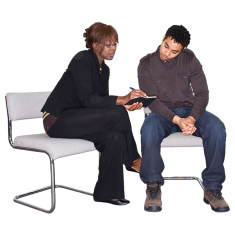
You can communicate with someone you trust about these questions.
There are many people you might trust.
For more information about who you might trust go to https://www.idmhconnect.health/
someone-trust
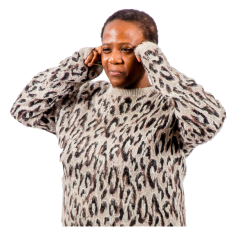
You might feel stressed if people ask you questions about your gender or sexual identity.
You might want to communicate your stress to your mental health worker.

You might not know how to communicate that the questions cause you stress.
You might not know what words to use.

You can learn how to communicate about your gender and sexual identity.
You can use the information sheets below
- Family Planning Australia's All About Sex factsheets https://www.fpnsw.org.au/
factsheets/individuals/
disability/all-about-sex

- CHANGEs LGBTQ+ Easy Read guide https://www.changepeople.org/our-work/lgbtq-an-easy-read-guide
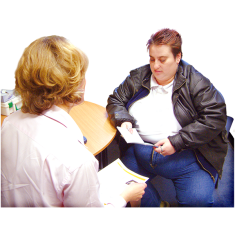
You could ask the mental health worker to read the factsheets with you.
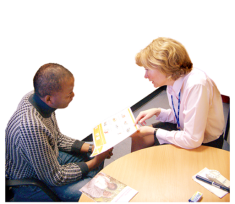
This might support you to start the discussion about your gender or sexual identity.
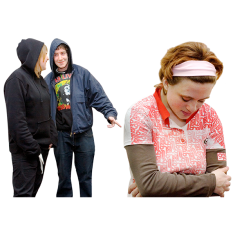
You are worried the mental health worker will not want to help you because you are LGBTQ+
This is what you can do.
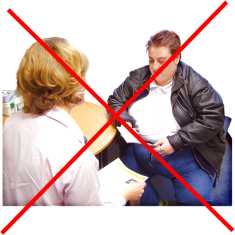
You might be worried that the mental health worker does not want to help you because of your gender or sexual identity.

It is not OK for a mental health worker to say they cannot help you because of your gender or sexual identity.
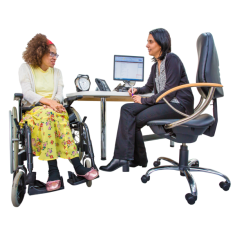
You can communicate with your GP about this.
A GP is the doctor that you see when you
- Are sick
- Need a health check
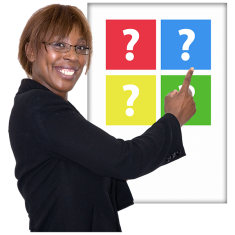
Your GP can give you more than one option of mental health worker who you can see.
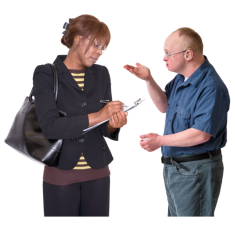
If your mental health worker treats you badly you have a right to make a complaint.
A complaint is when you let someone know you are not happy with someone.
Rights are rules about how everybody should be treated fairly.
A right is something everyone has.

For more information about your rights go to https://www.idmhconnect.health/your-rights/ER

You can communicate with someone you trust about your worries with the mental health worker.

You can communicate your worries with the mental health worker if you feel OK about it.

It is OK if you do not feel OK about it or do not want to communicate with the mental health worker.
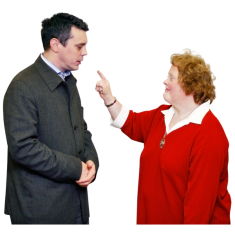
You can ask to discuss the problem with the mental health workers boss.
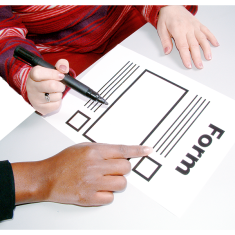
You can complain to other people like the Health Care Complaints Commission.
For more information about the Health Care Complaints Commission go to

For more about how to make a complaint go to https://www.idmhconnect.health/i-am-not-happy-service/ER

You are worried mental health workers will not understand you and your worries because they are not LGBTQ+
This is what you can do.

It can still be helpful to communicate with your mental health worker even if the mental health worker is not LGBTQ+.

You can ask your GP if they know any mental health workers who
- Work with LGBTQ+ people with intellectual disability
- Are an LGBTQ+ ally

An LGBTQ+ ally is someone who supports LGBTQ+ people and speaks up for them.
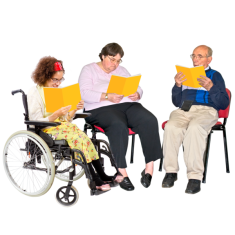
You could get support from services such as Family Planning Australia.
For more information about the service go to
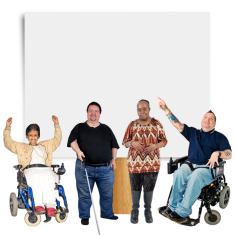
They can support the sexuality needs of people with intellectual disability.
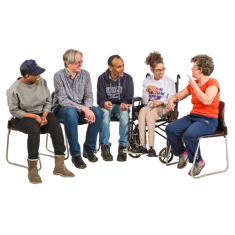
You can join community or support groups if you want to communicate with other LGBTQ+ people.
A support group is a small group of LGBTQ+ people you meet with to communicate.
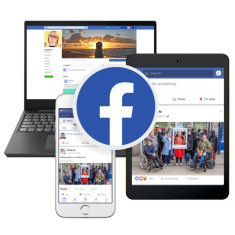
You can join a group like the Sydney Queer and Disability Community

You can also ask your mental health worker or GP if they know any groups you can join.

Below is a list of services and supports to support people who identify as LGBTQ+.

Family Planning Australia can support people with disability with their sexual health and relationships.
For more information go to

Family Planning Australia also has Easy Read information about
- Relationships
- Sexual health
- Sexual identity
To read the information go to https://www.fpnsw.org.au/
factsheets/individuals/disability/
all-about-sex
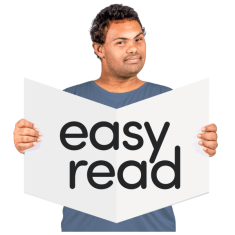
CHANGE has an Easy Read guide on being LGBTQ+.
CHANGE is a group that is not in Australia but the information might still be helpful.
For more information go to https://www.changepeople.org/our-work/lgbtq-an-easy-read-guide

Twenty10 helps people in NSW between 12 and 25 years old who identify as LGBTQ+.
The services are for everyone not just people with intellectual disability.
For more information about Twenty10 go to https://www.twenty10.org.au/
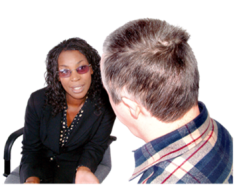
Twenty10 provides
- Counselling

- Mental health support
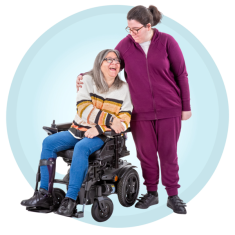
- Support for social skills

QLife is a chatline that provides free LGBTQ+ peer support and referrals.
You can
- Call QLife on 1800 184 527 between 3pm and 12am midnight every day
- Chat to QLife online https://qlife.org.au

A referral is when someone suggests you see a worker who can support you.

Sydney Queer and Disability Community is a group on Facebook that raises awareness for LGBTQ+ people with disability.
For more information about the community group go to
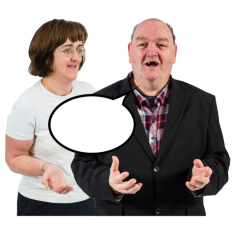
Rainbow Rights and Advocacy is a self-advocacy group.
A self-advocate is someone who speaks up for themselves.
Rainbow Rights and Advocacy is run by and for LGBTQ+ people with intellectual disability.
For more information go to https://rainbowrights.com.au/
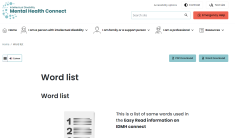
There are some tricky words on this Easy Read page.
For more information about these words go to